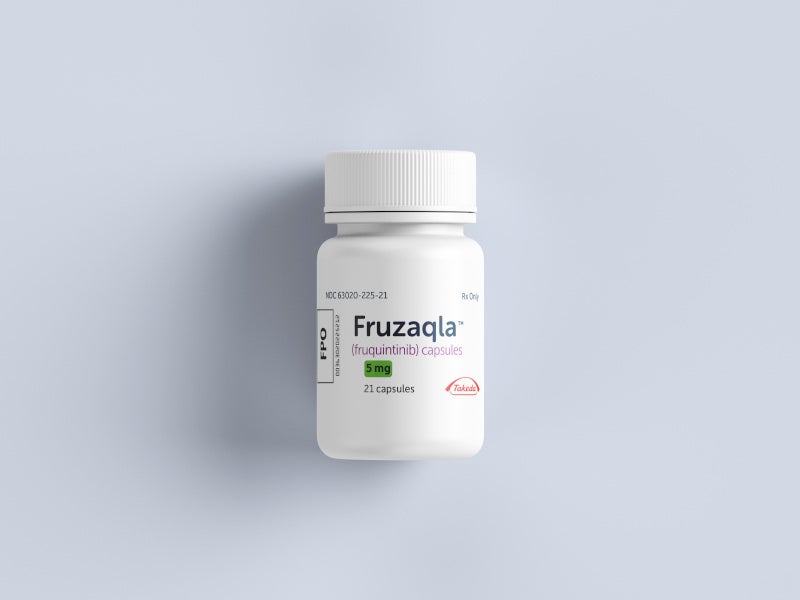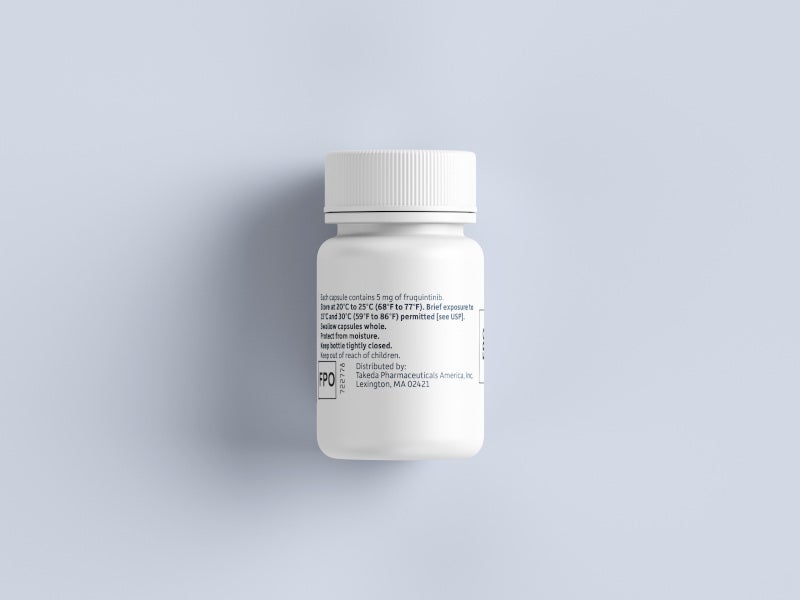FRUZAQLA® (fruquintinib) is a kinase inhibitor indicated to treat adults with metastatic colorectal cancer (mCRC).
It is a novel oral targeted treatment designed for once-daily use, offering a non-chemotherapy option for individuals who have undergone prior treatment with specific anti-cancer medications. The anti-cancer medications may include chemotherapy with fluoropyrimidine, oxaliplatin and irinotecan-based drugs, as well as anti-vascular endothelial growth factor (VEGF) therapy.
Additionally, it may be combined with anti-EGFR therapy for those with RAS wild type (a normal gene) and deemed medically suitable.
FRUZAQLA was originally developed by HUTCHMED, a biopharmaceutical company based in China. HUTCHMED introduced the drug to the Chinese market after obtaining approval in September 2018. The product was developed in collaboration with Eli Lilly, a pharmaceutical company based in the US, and marketed under the brand name ELUNATE® in China.
Takeda holds the exclusive rights to further the development, commercialisation and manufacturing of FRUZAQLA outside of Mainland China, Hong Kong and Macau, under an agreement signed with HUTCHMED in January 2023.
FRUZAQLA is available in two strengths, specifically a 1mg hard gelatine capsule with a white opaque body and a yellow opaque cap, and a 5mg capsule distinguished by a red opaque cap.
Regulatory approvals for FRUZAQLA
The European Commission (EC) approved FRUZAQLA in June 2024 as a monotherapy for metastatic colorectal cancer (mCRC) based on the Phase III FRESCO-2 clinical trial.
The US Food and Drug Administration (FDA) approved it in November 2023, following results from both FRESCO and FRESCO-2 studies.
FRUZAQLA is the first and only selective inhibitor of all three VEGF receptor kinases in the US and Europe for previously treated mCRC, regardless of biomarker status.
The drug is also under review in Japan and Australia.
Colorectal cancer causes and symptoms
Colorectal cancer is a prevalent disease characterised by abnormal cell growth in the colon or rectum. Typically affecting older adults, colorectal cancer often begins as benign polyps that can, over time, transform into cancerous tumours. Early detection through regular screening is crucial for the removal of polyps and the prevention of cancer development.
The disease progresses as colon cells undergo DNA changes, leading to uncontrolled multiplication and the ability to outlive healthy cells. It results in tumour formation, which can invade surrounding tissues and eventually metastasise to other body parts.
Symptoms of colorectal cancer are not always clear in the early stages but may include changes in bowel habits, rectal bleeding, persistent abdominal discomfort, fatigue and unexplained weight loss.
Ranking as the third most common cancer worldwide and the second-leading cause of cancer-related deaths, colorectal cancer represents a significant health concern.
FRUZAQLA’s mechanism of action
FRUZAQLA works by inhibiting tumour angiogenesis, essentially cutting off the tumour’s blood supply, which is vital for its growth and survival. As a selective oral inhibitor of VEGFR-1, 2 and 3, FRUZAQLA effectively blocks the pathways that facilitate the formation of blood vessels in tumours.
The drug’s design enhances selectivity, reducing off-target kinase activity and allowing for robust drug exposure and sustained target inhibition. The selectivity also allows options for FRUZAQLA to be used in combination with other anti-cancer therapies.
Clinical trials on FRUZAQLA
The approval of FRUZAQLA for treating mCRC was based on robust data from two extensive Phase III clinical trials, namely FRESCO and FRESCO-2. The trials collectively involved more than 1,100 patients and evaluated the efficacy and safety of FRUZAQLA in a population that had previously undergone treatment for mCRC.
FRESCO-2, an international, multi-centre, randomised, double-blind, placebo-controlled study, assessed FRUZAQLA’s efficacy in patients with mCRC who had experienced disease progression following treatment with chemotherapy and with anti-VEGF and anti-EGFR therapies. The trial enrolled 691 patients who received either FRUZAQLA or a placebo alongside best supportive care (BSC) until disease progression or toxicity was observed.
The primary endpoint was overall survival (OS), with progression-free survival (PFS) as a secondary metric. Results indicated that FRUZAQLA significantly increased OS (7.4 months) compared to the placebo group (4.8 months) and improved PFS as a supplementary metric.
Similarly, the FRESCO trial, conducted in China, was a multi-centre, randomised, double-blind, placebo-controlled study that involved 416 patients. Participants, who had progressed after chemotherapy, were randomised to receive either FRUZAQLA plus BSC or a placebo plus BSC. The primary endpoint was OS, with PFS as a secondary outcome measure. The addition of FRUZAQLA to BSC significantly enhanced OS compared to the placebo group.
Both FRESCO and FRESCO-2 trials met their primary and key secondary efficacy endpoints, demonstrating a consistent benefit among the 734 patients treated with FRUZAQLA. The safety profiles were consistent across both trials.
The most frequently reported serious adverse events in the clinical trials were hypertension, palmar-plantar erythrodysesthesia syndrome, proteinuria, dysphonia, abdominal pain, diarrhoea, and asthenia.





